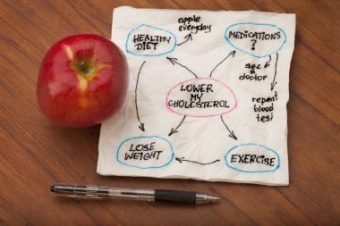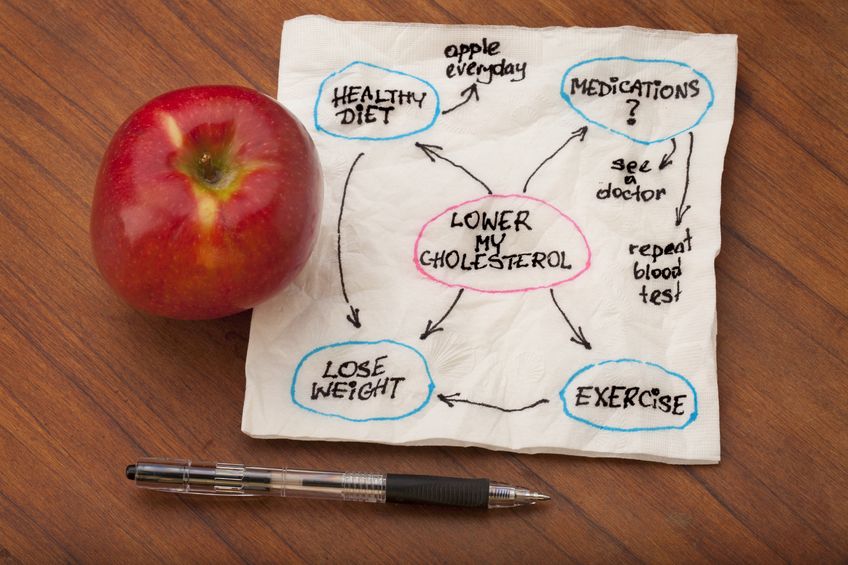Blood levels of LDL cholesterol (LDL-C) are often assessed when evaluating the risk of future heart disease.
Cholesterol is a fatty substance. Fats are insoluble in water and can therefore not be transported in blood on its own.
The body’s solution to this problem is to bind cholesterol to certain proteins that function as transport vehicles carrying different types of fats such as cholesterol, triglycerides (TG) and phospholipids. These combinations of fats and protein are termed lipoproteins. Low-density lipoprotein (LDL) is one of the body’s lipoproteins and an important carrier of cholesterol.

LDL-C is an important marker for the risk of developing heart disease.
Many studies have shown a strong and graded correlation between LDL-C and the risk of CVD, both in women and men. However, this association appears to become less prominent with increasing age, and some studies have suggested that low LDL-C may be associated with increased mortality in older adults.
Available evidence suggests that lowering blood levels of LDL-C reduces the risk of CVD.
According to the European Society of Cardiology, the results of epidemiological and clinical trials confirm that the reduction of LDL-C must be of prime concern in the prevention of CVD.
The Role of Cholesterol
Cholesterol is an organic molecule included in the sterol family.
Sterols are chemical substances, classified as lipids or fats, although they are chemically different from other types of dietary fat, such as triglycerides and phospholipids. Unlike triglycerides, sterols contain no fatty acids. Cholesterol is the best-known sterol, mainly because of its proposed role in atherosclerosis and cardiovascular disease.
Cholesterol is a major structural component of cell membranes and is especially abundant in nerve and brain tissue. It is also a precursor molecule. For example, vitamin D is synthesized from cholesterol.
Cholesterol is also a precursor of important hormones such as progesterones, glucocorticoids (cortisol), mineralocorticoids (aldosterone), androgens (testosterone) and estrogens.
Cholesterol occurs only in foods of animal origin.
Because the body can synthesize cholesterol, it is not needed in the diet.
Most of our cholesterol is synthesized by the liver. Studies have shown that increasing dietary cholesterol may reduce synthesis, although probably not by an equivalent amount.
The Role of Lipoproteins
A standard lipid panel provides information about the amount of cholesterol carried by different lipoproteins.
The main role of lipoprotein particles is to transport fats such as triglycerides and cholesterol in the blood between the organs of the body.
There are five major types of lipoproteins; chylomicrons, very low-density lipoprotein (VLDL), intermediate-density lipoprotein (IDL), low-density lipoprotein (LDL) and high-density lipoprotein (HDL).
LDL is called low-density lipoprotein because LDL particles tend to be less dense than other kinds of cholesterol particles.
HDL cholesterol (HDL-C) is often termed the “good” cholesterol while LDL-C is usually termed the “bad” cholesterol.
What Does High LDL Cholesterol Mean?
Elevated levels of LDL-C in the blood are associated with increased risk of atherosclerosis and heart disease.
There are specialized receptors on cell surfaces that bind LDL-C, these are called LDL-receptors. A lack of LDL-receptors may reduce the uptake of cholesterol by the cells, forcing it to remain in the circulation thereby raising blood levels.
In familial hypercholesterolemia, which is a genetic disorder, the body is unable to remove LDL from the blood. This leads to high levels of LDL-C in the blood, which may severely increase the risk of cardiovascular disease, even at a young age.
How Is LDL Cholesterol Calculated?
Cholesterol levels are measured in milligrams (mg) of cholesterol per deciliter (dL) of blood in the US and some other countries. Canada and most European countries measure cholesterol in millimoles (mmol) per liter (L) of blood.
Blood tests typically report LDL-C. These numbers are usually based on calculation, using the Friedewald equation that includes total cholesterol, HDL-C, and triglycerides. This equation relies on the assumption that the ratio of triglyceride to cholesterol is constant, which is not always the case.
If mg/dl is your unit, like in the United States the formula looks like this:
LDL cholesterol = [Total cholesterol] – [HDL cholesterol] – [TG]:5
If mmol/l is your unit like in Australia, Canada, and Europe the formula looks like this:
LDL cholesterol = [Total cholesterol] – [HDL cholesterol] – [TG]:2.2
Thus, LDL-C calculations may have limitations when blood triglyceride levels are either high or low. Direct LDL -C measurements are also available, but are less often done due to higher costs.
Some studies show that the number of LDL particles (LDL-P) may be a better predictor of risk than LDL-C. LDL particle size may also be important when assessing risk.
LDL Cholesterol Range
It is considered important to keep cholesterol levels, especially LDL-C within certain limits. If you have other risk factors for heart disease, such as high blood pressure, diabetes, or if you smoke, keeping LDL-C low becomes even more important. Hence, when considering the “normal” range for LDL-C, the risk or presence of CVD has to be taken into account.
Here you can see how LDL-C levels are interpreted:
LDL Cholesterol Range
- above 190 mg/dL (4.9 mmol/L) is considered very high
- 160 – 189 mg/dL (4.1 – 4.9 mmol/L) is considered high
- 130 – 159 mg/dL (3.4 – 4.1 mmol/L) is considered borderline high
- 100 – 129 mg/dL (2.6 – 3.3 mmol/L) is considered near ideal
- below 100 mg/dL (below 2.6 mmol/L) is considered ideal for people at risk of heart disease
- below 70 mg/dL (below 1.8 mmol/L) is considered ideal for people at very high risk of heart disease

How Can You Influence Your LDL Cholesterol?
If your LDL-C is high, your doctor will probably suggest lifestyle changes. Quitting smoking will be helpful and so may eating whole grain, oatmeal, olive oil, beans, fruit, and vegetables. Most doctors will recommend eating less saturated fat, found primarily in meat and dairy products.
Trans fats should be avoided. These fats are found in fried foods and many commercial products, such as cookies, crackers and snack cakes. However, keep in mind that food products labeled “trans fat-free” may still contain some trans fat. In the US, if a food may be labeled “trans fat-free” if it contains less than 0.5 grams of trans fat in a serving.
Soluble fiber may help lower LDL-C. Soluble fiber is found in oats and oat bran, fruits, beans, lentils, and vegetables.
Regular exercise is desirable. Losing weight may be helpful.
Some studies show that low-carbohydrate diets may positively affect LDL particle size and number.
If lifestyle changes don’t help, your doctor may suggest medications that lower cholesterol. So-called statins are the most commonly used drugs for lowering cholesterol.
Studies have shown that statins improve prognosis among patients with an established CVD. Their role for treatment of raised LDL-C in healthy people (primary prevention) is less clear. The decision to give statins in primary prevention is usually based on other risk factors as well as the LDL-C value itself.


As noted above , LDL-C particle size is important. Generally, it is excessive carbohydrate consumption that drives particle size in the wrong direction. Saturated fats have a beneficial effect on triglycerides, particle size and HDL-C (1). Moreover, compared to other dietary factors, saturated fats have relatively little impact on cholesterol levels(2).
References
1. https://clinicaltrials.gov/ct2/show/NCT00895141
2. https://www.theheart.org/article/1267163.do
I agree with David. Refined carbs and modified fats are more of a problem than animal fat. Also, most statin users do not realise that the reduced CoQ10 production may cause heart muscle damage.
The reference you gave for (2) does not really support your conclusion.
The study had two experimental groups eating special foods to lower cholesterol and a control group eating a low-saturated fat diet. Both experimental groups had a greater decrease in cholesterol than the control.
But if you look at what the groups ate, you can see why the study does not say much about the effects of saturated fat. The control group lowered its saturated fat intake from 8.5% to 7.0% of total calories. The first experimental group lowered its saturated fat from 8.8% to 6.4%. The second experimental group went from 9.1% to 7.0%. All three groups lowered their saturated fat intake by about the same amount. It is no wonder the control group did not do as well as the two experimental groups.
Additionally, the control group only lowered it saturated fat by 22%. With such a small decrease it is not surprising they had only a small change in cholesterol.
https://jama.jamanetwork.com/article.aspx?articleid=1104262
Why is it that Doc’s push statin drugs when there is ample evidence that they calcify the artery?
http://www.greenmedinfo.com/blog/confirmed-coronary-artieries1
This is the very evil you are telling people you are saving them from by prescribing this most ugly of drugs
It is possible that there are different mechanisms behind coronary calcification and coronary artery narrowing. In one metaanalysis, coronary calcification was not affected by statin therapy although there was a consistent moderation of progression of coronary artery narrowing with statins. https://www.ncbi.nlm.nih.gov/pubmed/20843566
Of course we should be aware that there are side effects of statins. However, most people tolerate them well. That does not change the fact that we should use these drugs carefully and only when indicated. There are certain conditions where statins have been shown, in large clinical trials, to reduce risk and improve prognosis, for example following an acute myocardial infarction. Not prescribing statins under such conditions, would not be considered good clinical practice.
My wt 75 age 36..cholest..6.5….ldl 5.2..hdl 1.0…..please suggest me is that risk
my ldl c is 70mg/dL. M I facing any risk of heart or other disease? I am a male and my age is 44yrs and wt is 70kgs. Pl give your opinion in detail.
Per the article above:
below 70 mg/dL (below 1.8 mmol/L) is considered ideal for people at very high risk of heart disease
While the LDL-C is probably not going to be a significant factor for Heart (or other disease) that doesn’t mean it cannot happen. If you are truly concerned about the possibility, you should probably ask your regular physician that is likely more familiar with YOUR specific health factors than trying to pin down a doctor on an online forum who knows little more than your age, weight and LDL-C number.
My ldc is 5.2 hdl is 1.0…..I m 36 year ol..plz suggest me cholesterol is 6.5
Weigt is 75
My ldl c is 110mg/dl
Age 29 female
weight 106
height 171 cm
I am a thyroid patient
am I facing any risk
doctor please advice in diet
Has anyone followed Dr. Esselstyn or Dean Ornish or Dr, John Mcdougall.
Heart disease is a food borne illness and has been shown now for 20 years it can be halted and reversed with diet. I am truly amazed with all the evidence that most Dr.’s never mention this. Watch Dr. Mcdougall’s videos, man has lived primarily on starch since the beginning of time and it so true when you think about, are you attracted to a dead carcass, is that your food? But real meat eaters are attracted to it raw meat. We were never meant to eat animals, it’s not our food!!!!
is increased LDL-C indication of some damage done to arteries already, if yes, then is it repairable ?
Raj
No, LDL-C is not an indication of any damage to the arteries.
I am 40 years old, male, weight 70 kg, height 172 cm, total cholesterol 240 mg/dl, ldl 170, hdl 50 and tg 140. Sould i take statins?
Depends on your other risk factors; family history, high blood pressure, smoking etc. You can use the ACC risk calculator https://www.cvriskcalculator.com/
If your 10 year risk is above 7.5% statins may be considered.
Thanks ….
BP 130/80 and not diabetic
Occasional smoker
Diabetes runs in my mom’s family
My husband is 32 years old , my weight is 72kg ( height 168cm) and I had done one lipid profile test last week
Total Cholestrol is 233mg
Ldl 160
Hdl 50
Can you please advise is this high risk of heart disease ?
What are the food we can use to control the LDl
My Husband is 32 years old, his weight is 72kg and height is 168cm his lipid profile as follows
Ldl 160
Hdl 50
Total Cholestrol 233
Is this high risk of heart disease and how we can control the ldl ??
I just received a report that my LDL is too high. This test was performed because industrial wind turbines were put up around my home and began turning eleven months ago, which was followed by a rather sudden onset of heart pain that has gotten progressively worse. I would be very interested in thoughts on this.
I started a keto diet 1 month ago. Protein 120 grams, C 204; TG 55-> 84, HDL 54–> 59, LDL 72-> 128, Apo (A) 9-> 3.55, HS CRP 0.23-> 0.26. TG/HDL 1.02-> 1.4 TC/HDL 2.7–> 3.45.
I don’t have CAD although a CT Cor showed a possible asymptomatic mild build up after a CT calcium score was somewhat elevated. Family history nothing early, and no other risk factors. Except being 53 yo.
My take is I’m somewhat concerned about the rise in LDL, but see my TG/HDL ratio being excellent suggesting my LDL particle size is larger and less atherogenic. Also my TC/HDL ratio is still in the ideal category. and TG are still excellent at 84.
I am reassured that my HS CRP is still excellent and that my Apo (a) has dropped by 2/3’s.
I will keep checking and re measure these levels in 2 months and then every 3 months.
I’ve read testimonials that said their numbers went up but then came down maybe as adaptation continues- I’m early in this process.
I also check my blood ketones 1-2 times a day and find myself 1.2 to 1.4, which is the nutritional ketosis range Phinney and Volek describe in their book art and science of low carb living.
I do lift weights 4-5 times a week and do light cardio.
I feel great on this ‘diet’, am not hungry, usually, especially considering I eat hardly any carbs.
I also feel that I’m getting more energy and look forward to a keto adapted state with more of a steady state energy production from ketones and less energy swings that I got from carbs.
I’m down 9 lbs and waist is down almost an inch. 33.5-> 32.7, BF by calipers was 8% now 7-8%.
any thoughts about these early number changes?
Thank you for your blog.
I am a 66 year old male 6 ft 2 in 170 lbs.in good health.I exercise daily and have a good diet My recent lipid panel scores were total cholesterol 180 triglycerides 66 HDL 59 and LDL 107. I have been on 80 mg Lipitor for 6-8 years subsequent to a stint placement in 2004. Would zetia be a drug that I should consider taking?
What is missing from this article is what I call ” the other side of the coin”. We should look at the cause of cardiovascular disease beyond simply calling out LDL-C as the culprit. Remember the body is pretty clever at deciding what levels we need. Ok. I propose that the reason for attributing CVD to LDL-C is centred around free radicals. Free radicals damage the lining of the arteries and make it rough and easier to stick to, and free radicals oxidise and therefore solidify fats and therefore cholesterol. I suggest therefore that the PRIMARY offensive should be to INCREASE anti-oxidants before reducing cholesterol levels.
Statin drugs destroy muscles, interfere with memory, and significantly lower CoQ10 levels. They are by NO means advantageous to the human body,
Hello I am Rakesh My weight 72 age 31 year old my lipid profile as follows
Cholesterol Total, Serum 249 mg/dl
Cholesterol HDI 43.7 mg/dl
Cholesterol LDL 183.7 mg/dl
LDL-C/HDL-C 4.2 mg/dl
Cholesterol Total/HDL-C, Ratio 5.7
please suggest me is that risk
Is this high risk of heart disease and how we can control the ldl ??
I am 52 years old and in excellent health. My LDL is 48, and has always been below 70. Total Chol 124; HDL 59, Trig 80. I eat large amounts of saturated fats, including dairy (real [raw] milk and cream), red meat, butter, fresh eggs (ducks and chickens) and always have. I don’t eat sugar, processed foods, soy and very few carbs.
The gene that you are born with plays a mojor role, for some people. I exercise vigorously and often. I eat well, always have. I have tried all the naturals things to lower the LDL. I cannot, as both my parents have a history of elevated LDL.
It about managing everything we do, whether it be food, exercise, medicine, relaxation. I was hell set on on taking statin. I am 52 and I will try it and monitor to see what is next.
Have you tried low carb high fat diet? Not sure what “all the natural things” encompasses. Genes are one piece of the puzzle but not the entire puzzle. There are several double blind studies that show low carb high fat diets make favorable changes to lipids. That was mentioned in the article regarding LDL particle size. Double blind studies significantly remove the genetic factor from the equation. Many studies show people with similar genetic make up in the same region can have different health outcomes depending on diet.
good job